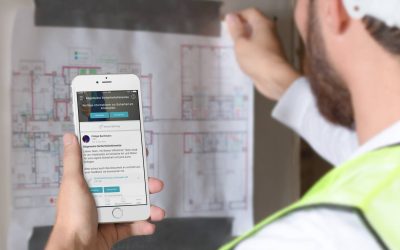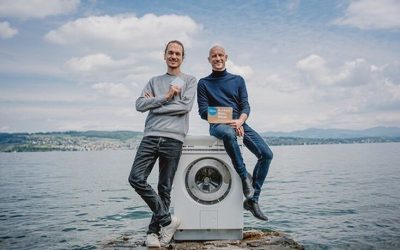Zurich-based Avrios AG found an exit partner with Battery Ventures, a US-based buy-and-build fund, which also acquired Vimcar from Berlin and is now planning to merge the two companies. We spoke with Andreas Brenner the co-founder of Avrios, he is also EO member and alumni of the EO Accelerator program. In this exclusive interview he is sharing some insights about the exit and how EOA has influenced him as an entrepreneur.
“Supported by the inputs from experienced and same-aged peers, I looked at business and myself from the outside.”
When and why did you join EOA?
Andreas: „Good question. I think it might have been 2015.
I joined because I thought that growing a company required a support network and self development. A friend (Adrian Locher) referred me to EO and convinced me that it was not yet another networking association, but rather exactly the place to come to grow as an entrepreneur.“
What did you learn during EOA?
Andreas: “The EOA schedule forced me to regularly sit down and reflect on the big questions in business and life. Supported by the inputs from experienced and same-aged peers, I looked at business and myself from the outside. In the early days of growing a venture backed startup that did not come naturally to me. In hindsight, this is probably one of the most valuable life lessons I ever learned anywhere.“
In EO one says that founders should work “on” the business and not “in” the business, was that a reason to step down as the CEO in 2021 and what did it mean for your company?
Andreas: „To me the ultimate achievement is to build a generational business that can outlast me whilst still going from strength to strength. I am very proud that we have built a business with a sensible and scalable business model. I am also very proud to see that Avrios is striving without me being an active part of management.“
What is the status of the acquisition? There are already many news articles but the status is still pending. What does that mean? Can you give some insights on the acquisition process?
Andreas: “The deal has successfully closed. The management team and I discussed possible growth strategies for Avrios several years ago. It became clear that M&A was one potential path to grow the business from a local champion into a global leader. So we started to build relationships with more than 40 potential acquisition targets as well as dozens of potential investors in order to validate our strategy. When we decided that it was now time to execute this strategy the process took only a few months and was very smooth.“
Everyone is interested in the exit price. In one article it said Battery Ventures paid € 200 million, € 125 million went into Vimcar. So was Avrios sold for 75 million?
Andreas: The only thing I can say is that everyone who ever invested in Avrios got significantly more money back than they invested and the founders are also happy.
Did you manage to avoid giving liquidity preferences to your investors?
Andreas: „I am not sure I understand the question. If we would have had a bad exit, then our investors would have been entitled to liquidation preferences but we had a good exit. In general, I don’t think not granting liquidation preferences to investors is a very smart idea in a high growth business. This is 101 of option pricing. Investors would have to lower the valuation and founders as well as employees dilute more. If you build a good business and you deliver more or less what you promise, then clean liquidation preferences are a great way to align interests.“
“It is my belief that taking care of employees creates a culture where they take care of customers, which creates value for all stakeholders.”
According to Crunchbase you raised 22 million. Did the investors push for a higher exit price?
Andreas: “As an entrepreneur I think it is my duty to take the interests of all stakeholders into account. First, the employees, then the customers and finally the shareholders as well as lastly, society and planet earth. So my job is to create a vision and strategy that takes all those stakeholder interests into account and to hire a team which can challenge, improve and execute this strategy. It is my belief that taking care of employees creates a culture where they take care of customers, which creates value for all stakeholders.
In other words: I enjoy working with investors who make me think but I am ambitious enough to not need to be pushed by an investor to deliver great outcomes. It is part of my job as CEO to do that.“
Was it an easy decision to sell?
Andreas: Francine, my successor as CEO, was part of the management team which built the M&A strategy that is now being executed. I strongly believe in Francine and I strongly believe in this strategy. I also think Battery is a great fund with a strong track record in executing buy & build strategies in SaaS. What more could one ask for than a solid platform business with a strong CEO, backed by a strong investor who is willing to pay a price that returns money to all previous owners.
“Today that means that I am creating a lot of value for American pensioners while creating almost no value for Europeans.“
Do you think there is room for bigger exits in Europe? And especially exits within the region (Switzerland or DACH) or IPOs.
Andreas: “There is sufficient evidence that great (tech) companies can be built anywhere. I see 3 challenges in Europe:
- Most Swiss founders don’t truly think global. For example, typical Swiss founders find themselves raising less money at lower valuations than American counter parts, but at the same time target the smaller markets and only ever speak to 10-15 investors for a round. If the American counter-part targets the larger market and speaks to 100 investors to raise funds, then the different outcomes are not systemic in nature but rather self-made by the entrepreneur.
- As long as Europe continues to produce politicians that focus on regulation, we will only continue to make our life harder. We should remove barriers, unify our markets and – like Switzerland – remove barriers for the truly large pools of capital, like pension funds, to invest into startups. To this end, Switzerland is far from perfect but leading by example. That’s one of the reasons why I am here.
- As an entrepreneur, I will happily work with the best investor, wherever they may come from. In my experience, we will have to wait for a very long time until large growth companies will be funded by European money, independent of whether they are private or public market investors. Our tech / software ecosystem is still so immature that for now, we mostly educate some of the world’s best people, de-risk the technologies they build (Series Seed funding), de-risk the business models (Series A funding) and then leave the return to non European investors (Series B+ funding). Today that means that I am creating a lot of value for American pensioners while creating almost no value for Europeans.“
Are there any final tips you would like to share with entrepreneurs in EO (especially the Accelerator members)?
Andreas: „Trust in the EO process. It will take some years until you REALLY understand the value EO brings to your business.“
Thank you, Andreas, for sharing your story. It is great to see that EO/EOA provided one of the most valuable lessons to you. You illustrated vividly how you, Francine and the management team created an M&A strategy and a large target list. Congratulations that it played out so well for you and your investors. We hope that some entrepreneurs, politicians and late-stage investors will take your recommendation to heart and create more value for the European ecosystem. All the best with your new ventures.
To learn more about EO and the EO Accelerator, join our monthly info session.
Interview and article by: Vincent Irrling
Additional resources:
- Bloomberg: https://www.bloomberg.com/news/articles/2023-01-05/battery-ventures-invests-212-million-in-european-software-duo
- Businesswire: https://www.businesswire.com/news/home/20230105005167/en/Battery-Ventures-Agrees-to-Make-Significant-Investment-to-Drive-Growth-Innovation-in-European-Fleet-Management-Technology-Sector
- Avrios: https://www.avrios.com/
- EO Accelerator: https://eoaccelerator.ch/





